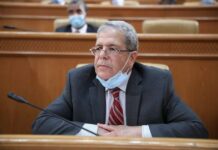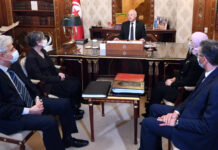A number of Tunisian and foreign political analysts and professors of political science and constitutional law presented a number of possible “scenarios” for managing the post-July 25 phase:
Some of them are romantic, such as expecting a return to the “normal” situation after President “Saied” changes his decisions and returns to his senses and prudence, as there is no possibility to protect achievements except by returning to the “democratic” path.
Others seem “realistic”. It is supposed to appoint a prime minister and a ‘technocratic government’ and start preparing for premature elections in a political climate that everyone admits is very turbulent.
Others are linked to a “culture of consensus”, as the president will be able to impose the “road map” on the parties, and it is likely that it will be based on a call for parliament to resume its work with early elections.
In addition to the scenario that identifies with the experiences of coups. It is expected that the “bureaucratic coup” will be transformed into a “military coup”.
However, these hypotheses, expectations, guesses, and readings were quickly lost to the wind, as the president’s plans remain unknown, loose, incomprehensible, and unable to be subjected to “traditional” mechanisms of analysis, a matter that not only disturbed Tunisian political elites, but also raised the fears of many foreign figures associated with spheres of influence.
In light of a media and political scene that has been based for years on analysts competing to provide the “correct” reading of the political reality, and their keenness to position themselves in the circle of “geniuses” who are more able to understand and decode codes and who are more familiar with what is going on behind the scenes in the palace, parliament and the presidency, we can imagine the predicament these “analysts” are experiencing after their balance has run out, their capital has shrunk and their case has been exposed, and they can no longer claim that they are able to read developments and clarify decisions with the same “reliability” tendency.
Here, it is correct to say that the decisions to freeze and disable the faculty of understanding included representatives, politicians, as well as analysts. Here, the discourse of some of them changed, and they admitted their failure to understand what was going on, while most of them continued to claim that they had caught the threads of the game.
If this is the situation of those who practice analysis, what is the situation of the head of the “largest party in the country”?
What draws attention in Ghannouchi’s statements since July 25 is the confusion at the level of formulating positions and producing discourses, which establishes evidence that the political “earthquake” broke the solid foundations of the movement, scattered accounts, and weakened the ability to devise strategies. The rhetoric of promise and threats and the threat of street war juxtaposed with that of dialogue and sitting at the negotiating table, and the coup suddenly turned from a tool to demolish the democratic experiment into a valuable opportunity for reform and starting from a different location.
Fears of a return to tyranny have dissipated, and there has been talk of Ennahda‘s willingness to participate in the war on corruption and build the actual reform path.
Ennahda‘s position in the beginning within the framework of the party opposed to the decisions of “Kais Saied” and the defender of the revolution, merits and democracy did not find sufficient support from within the party, as how can someone who has been on the throne for more than 40 years claim to be a supporter of democracy? And how can someone who does not believe in criticism, deliberation, good governance and lead a battle against the tyrant?
Ghannouchi was not able to influence his bases and the general public and convince them that he wants to defend the interests of Tunisians, as how can someone who colluded with the “corruption barons” and turned a blind eye to the “corrupt people on earth” wear the dress of a just reformer?
The course of July 25 calls for great “cognitive” humility, a tireless search for new methodological tools, and an attempt to adapt to the new context, where the father holds the reins of the matter, closes the doors and blocks the outlets, enjoying that he is the only person able to move the threads of the game and that he is the “enigmatic”.
Perhaps it is useful in this context to go back to the history of the formation of authority in Rome and Greece, where the authority of the head of the family was mixed with the authority of the politician.
As long as all attempts to understand, analyze and present hypotheses and predictions have proven their “limitations,” it is okay to admit that the earthquake was not only political, but rather tampered with the methods of understanding and methods of analysis.
By: Amel Grami
Published in Al-Maghreb Newspaper. Friday 27, 2021. https://bit.ly/3zpzjdE
Translated by: Bechir Moussa
Amel Grami is a Tunisian scholar and Islamologist specializing in civilization, gender and women's rights.











